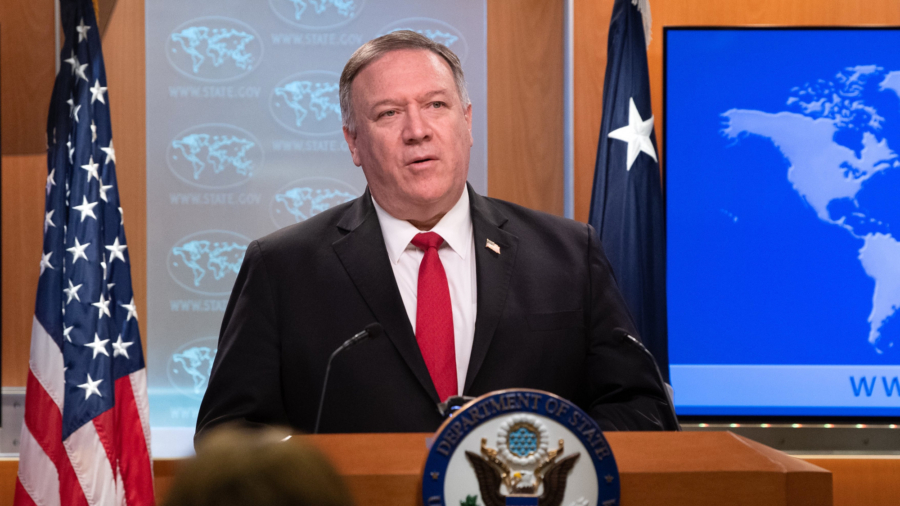U.S. Secretary of State Mike Pompeo on June 6 decried Beijing’s “obscene propaganda” exploiting the unrest across the United States, while calling out the communist regime’s expansive suppression of free speech and other human rights at home.
For more than a week, Chinese diplomats and state-run media have been reveling in the chaotic race-related protests triggered by the police custody death of George Floyd on Memorial Day. Much of the coverage heaps criticism of the U.S. response to the protests, and also attempts to draw comparisons between the unrest in America with the ongoing pro-democracy protests in Hong Kong, which had at times turned violent last year.
Observers say that the Chinese Communist Party (CCP) is taking advantage of the situation to stoke tensions domestically, divert attention away from its tightening grip on Hong Kong, and undermine the credibility of the United States and democratic governance.
Hawkish state-run newspaper Global Times last Saturday ran a commentary titled: “Watch out! ‘Beautiful sight’ in HK is spreading across the U.S.” The headline was a dig at remarks made by House Speaker Nancy Pelosi last year when she said the pro-democracy protests in Hong Kong were “a beautiful sight to behold.”
“This laughable propaganda should not fool anyone,” Pompeo said in a statement on June 6.
The ‘beautiful sight’ difined by US politicians has eventually extended from Hong Kong to the US. Now they can witness it by their home windows. I want to ask Speaker Pelosi and Secretary Pompeo: Should Beijing support protests in the US, like you glorified rioters in Hong Kong? pic.twitter.com/tvg0kyK8j0
— Hu Xijin 胡锡进 (@HuXijin_GT) May 30, 2020
On Sunday, national security adviser Robert O’Brien warned that foreign adversaries, including Beijing, “are going to take advantage of this crisis to sow discord and to try and damage our democracy.”
The secretary called out CCP propaganda that seeks to conflate U.S. actions in the wake of Floyd’s death with the regime’s suppression of basic rights and freedom, labeling it as a fraud. He pointed to the regime’s crushing of voices not aligned with the Party’s views, from protesters calling for democracy to religious groups to whistleblower doctors sounding the alarm about the CCP virus in the early stages of the outbreak.
“In China, peaceful protesters from Hong Kong to Tiananmen Square are clubbed by armed militiamen for simply speaking out. Reporters writing of these indignities are sentenced to long terms in prison,” Pompeo said.
“In the United States, law enforcement—both state and federal—brings rogue officers to justice, welcomes peaceful protests while forcefully shutting down looting and violence, and exercises power pursuant to the Constitution to protect property and liberty for all. Our free press covers events wall to wall, for all the world to see.”
U.S. Attorney General William Barr said Thursday there were three sets of actors involved in the protests: peaceful demonstrators, opportunistic looters, and extremist agitators, including the far-left group Antifa and other similar organizations. He said the extremist agitators are instigating violence and “hijacking the protests to pursue their own separate and violent agenda.”
Chinese foreign ministry spokesperson Hua Chunying on May 30 responded to a tweet by the U.S. State Department decrying the regime’s encroachment into Hong Kong by writing: “I can’t breathe,” quoting what Floyd was caught on video saying before he died.
“The Chinese Communist Party’s callous exploitation of the tragic death of George Floyd to justify its authoritarian denial of basic human dignity exposes its true colors yet again,” Pompeo said.
“As with dictatorships throughout history, no lie is too obscene, so long as it serves the Party’s lust for power.”
From The Epoch Times


